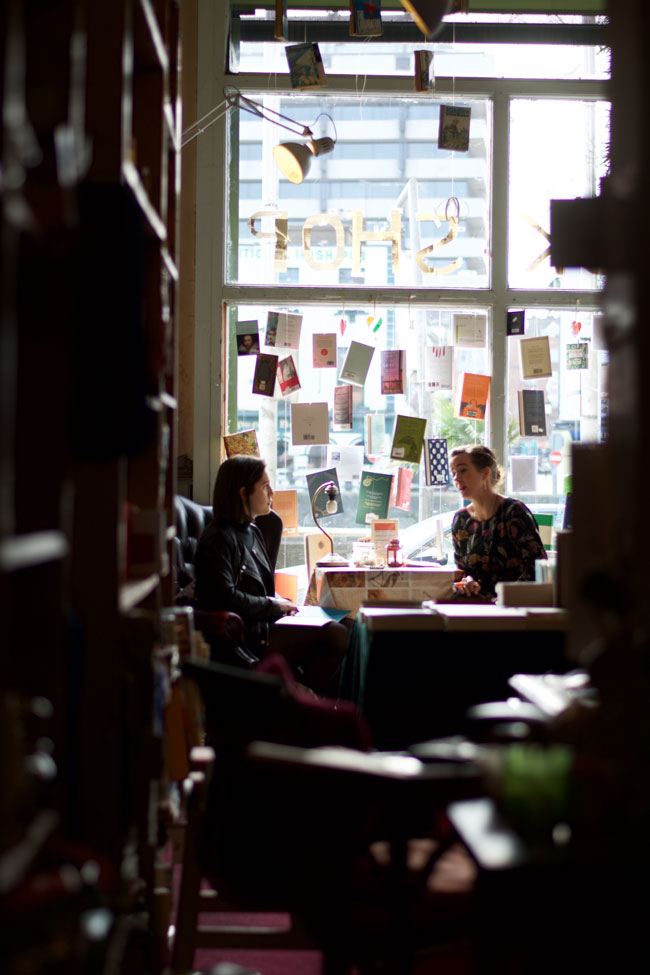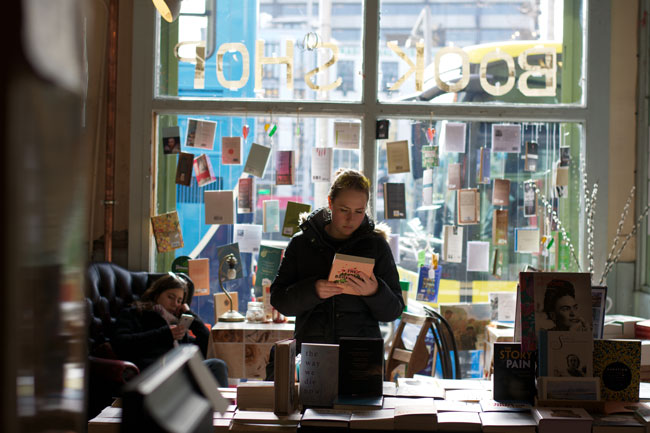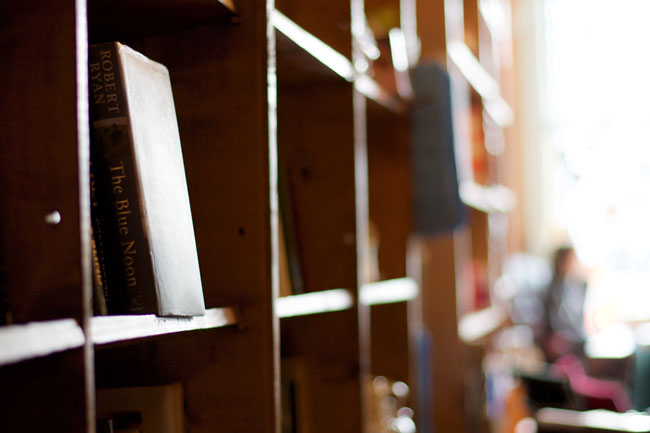
Describing Dublin as “inherently literary” seems quite the label to slap onto a place, with the implication that there is something innate about literature’s role in a locality being quite a claim. Yet, the history, folklore, oral tradition and musicality that underwrite almost all Irish artistic output make it nearly undeniable, really, especially considering the breadth of talent that Ireland has produced.
The claim on literary celebrities like Beckett, Joyce, Yeats, Shaw and Wilde is a marker of pride for many a Dubliner. Walking through the city with a discerning eye, and even its outskirts, buildings emerge with engravings boasting “WB Yeats lived here, 1880-1883” (Balscadden House in Howth). It doesn’t end there. Twenty-first century talent propels Ireland forward with the likes of Sarah Baume, Donal Ryan, Conor McPherson, Rob Doyle and Caitriona Lally, to name merely a few.
However, as reading habits change, Dublin’s literary tradition is being forced to compete with our modern day consumption of information, be it literature or news. One cannot help but wonder if the history of the city’s literary greats will eventually end up as mere textbook babble, buried by the onslaught of digital information.
The way in which we consume media today is unprecedented, reminiscent of a scene from The Jetsons Paradoxically, media seems to be consuming us. Computer screens glare with YouTube clips of Donald Trump’s faux pas, providing the backlight to a quick Snapchat, before informing a Twitter update on an iPhone. We flick between apps, screens and online sources with mindless ease. This situation is nothing new, especially to 21st-century students. Situated in Dublin, however, the threat of a dwindling literary culture has more import. Even with institutions like Trinity at the centre of Dublin’s literary scene, its impressive library beckoning students to delve into the written word, the availability of texts online and through e-readers provides an imposing opponent.
From a student’s point of view, it appears that preference has a tough time beating ease of access. As an English student, I favour a physical book, something dog-eared that’s lived a little. However, necessity would have it that PDFs and Kindle books with public domain rights are often the quicker, cheaper option. The romanticised view I held of perusing Ulysses while strolling through Front Arch has morphed into an altogether less enticing vision. Instead, I hastily skim a PDF under the fluorescent lights of the Lecky, glancing longingly at the black surface of my iPhone in hope of reprieve.
Retaining the integrity of printed books is up to the individual consumer and their desire to support Dublin’s booksellers
It must be a matter of principle, then. What we read and how we read outside of academia needs to be conscientious. Retaining the integrity of printed books is up to the individual consumer and their desire to support Dublin’s booksellers. One of the most exceptional of Dublin’s independent bookshops is The Winding Stair. Located just off the Ha’penny Bridge on the north side of the Liffey, it describes itself as “a relaxed haven in the centre of a bustling city.” And it is — quiet classical music tinkles over the shop as The Winding Stair’s manager, Máire Griffin, speaks to The University Times. “The store opened around 35 years ago as a kind of artistic and cultural hub, with the Dublin Magazine printed upstairs on the top two floors. It had some heavy revolutionary journalism going on with contemporaries of Mary Robinson writing for it. Also, well-known names like Colm Tóibín.” Since then, the shop has changed hands and the bookshop was condensed to the ground floor, with a second-hand section in the back. Griffin remarks, “The ethos of the shop works to try and provide what the mainstream stores aren’t providing, because of the fact that we can buy single copies and can afford to be more varied in our offerings”.
The ethos extends past just this assertion to something that stands out against the wider Dublin scene. “We like to keep it quite literary, quite random, a little bit obscure”, Griffin says, smiling. “And we focus on the Irish, we like to focus very much on contemporary and emerging Irish writers, because there is a fabulous wave of them.” She notes names such as Baume, Ryan and Doyle, calling them “fresh, edgy, and sharp”. She comments that “it’s much more exciting to be able to introduce new Irish writers to tourists that come in, particularly the younger ones”. Themes are expanding, providing a more inclusive experience of Ireland for readers with “less focus on misery, the famine, rural Ireland”. Modern literariness is pushing past the boundaries of a mythologised Ireland, or the Ireland canonised by Joyce and Yeats.

In response to the threat posed by e-books, Griffin is self-assured. “Certainly e-books have created a stable place in the market by now. There was a huge effect back in maybe 2010 or so, in England and America, but less so here in Dublin.” Outside of student use, they pose a smaller threat, “infiltrating less into the readership market”. For tourists and Dubliners alike, a bookshop still offers an enticing pull. “The customers that come in here are interested in broadening their minds when it comes to what they’re reading.” And certainly the physical layout of The Winding Stair aids this desire, being neither harried nor impersonal.“We have the right atmosphere, with the way the books are laid out, it creates a browsing curiosity”. Put simply, “it seems people are realising the value of books”, Griffin says. She gives the examples of children’s books, photography books, even cookery books, as wholly incompatible with the e-book format. She speaks about the development of a relationship between reader and text, which is sacrificed with the digitization of books. Although, she does concede, with a shake of her head, “I would have loved e-books in college”.
Attempting to maintain this small bookshop mentality even with its established reputation on the Dublin literary scene, lead bookseller of Hodges Figgis, Tom Hoban, tells The University Times that the shop strives to employ a truly “knowledgeable staff, which sets us apart from most other bookshops”. Marked by history, the store is an institution in Dublin, despite being owned by the corporate chain Waterstones. Hoban insists that this fact doesn’t detract from the feeling they try and cultivate in their customers. He remarks, “we have our 250th anniversary coming up next year, so obviously it’s been a major part of the Dublin literary scene for a while. Also, it’s the only bookshop mentioned in Ulysses”, he says with a quick grin. Hoban affirms Hodges Figgis’ relevance today as well, maintaining that their reputation doesn’t rest solely on their history. “We are still very much involved in the current literary world, with two or three book launches a week, as well as readings. And they are all open to the public.”
Hoban stresses the importance of browsing, of using our senses to determine which book in particular we want to forge a relationship with. The physicality of the book, its cover and its feel, provide a momentary rest for our swiping, typing hands
While a huge bookstore like Hodges Figgis, which enjoys the patronage of Trinity students and their sprawling academic booklists, might have less to worry about in the digital age, the matter of online reading habits still comes up. “We sold Kindles for a while a few years ago. We were reacting to what we thought the market wanted. But then there was a sense that we were kind of heaping our own funeral pyre”, he says. While it could be debated how well Kindles might burn on a pyre, Hoban’s metaphor certainly stands—e-books certainly don’t fit the spirit of a bookshop approaching its 250th year, a spot that Patrick Kavanagh and Brendan Behan used to frequent. Echoing Griffin, Hoban suggests that the era of the e-book might be waning: “Surprisingly enough, the e-book trend kind of died. I know people that use Kindles but it never stops them buying physical books. There is something a little bit soulless about them, even in the design.” The e-book effect seems to have stabilised, prompting a readership that prefers a discerning eye and a desire for a more intimate connection to the books and their vendors. Hoban stresses the importance of browsing, of using our senses to determine which book in particular we want to forge a relationship with. The physicality of the book, its cover and its feel, provide a momentary rest for our swiping, typing hands.

Hodges Figgis is a monolith, age and renown certainly ensuring its continued success. Yet, Hoban claims, “the size of it shouldn’t exclude it from having a local feel. It’s part of my role to make sure specific sections in the store should always feel like an isolated unit”. Again, he reiterates the importance of experience, process and conversation involved in choosing new reading material, insisting with conviction that “just because we are one of the biggest in the country doesn’t mean that we don’t try to build a rapport with every customer that comes in. We constantly try to make sure we are considered part of a wider community”. This mission couldn’t be done in any other city, he is quick to agree. Dublin cultivates a literary staying power.
On the other end of the spectrum lies The Secret Book and Record Store, tucked away on a bend in Wicklow St, it’s a low-ceilinged room overflowing with second-hand books. Owner, Dermot Carroll, spoke to The University Times, in between ringing up customers, about the strife that small second-hand shops undergo. “Rampant capitalism”, he contends, leaves little room in the market for bookshops like his own. He’s committed to his work, however, explaining modestly, “my job is to provide good books to people who want them, at a reasonable price”. Responding to how he chooses his ample and varied stock, he says, “really, I’ve chosen them all on the basis that if I had enough time, I’d read them all myself. If other people come in here and don’t find them interesting, they’ve got a problem, not me”, Carroll says wryly. Watching his interactions with the customers, though, it becomes obvious how much he cares about what they take away from his shop.
Literature isn’t just some commodity. It’s something that is strengthened by booksellers talking to the community
The book they leave with matters of course, but it’s Carroll’s exchange of a few happy words, or his insistence on fetching the same copy of a book in better condition, that proves this. Purchasing a book in this way is personable—it gives satisfaction, and thus, it feels affirmed. “People like to be able to smell, touch, feel, hold and own a book. You can’t get that from a Kindle, or whatever those things are”, Carroll says gesturing to my iPhone. He champions the bookseller’s duties that lie beyond just individual literary taste. “When you sell a book here, the person might feel obliged to tell you why they’re buying the book or you have a little chat, whereas, on the Internet, you don’t get that.”
After speaking with Carroll, and seeing the crowd of customers his shop attracts, one can’t help but feel that print books are never going to go out of fashion. He makes an intriguing point, playing off of what both Griffin and Hoban noted of the e-book’s recent loss of momentum: “The impact of digital books is such that it just spanks book publishers into a better performance. E-books have helped cut some of the slack out of their systems.” This final thought would leave any lover of literature optimistic for the future of print. Griffin, Hoban and Carroll, three ardent representatives of Dublin’s literary scene, support perfectly Hoban’s decisive words: “Literature isn’t just some commodity. It’s something that is strengthened by booksellers talking to the community.” It comes down to the fact that, indeed, we crave a connection to the sensory experience of both buying and reading a book.






